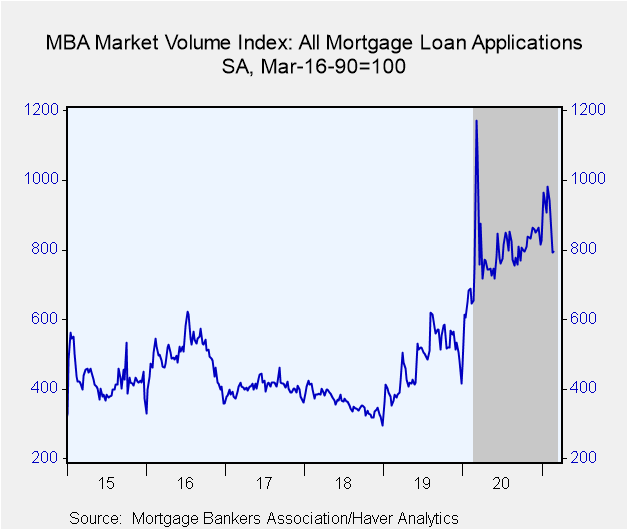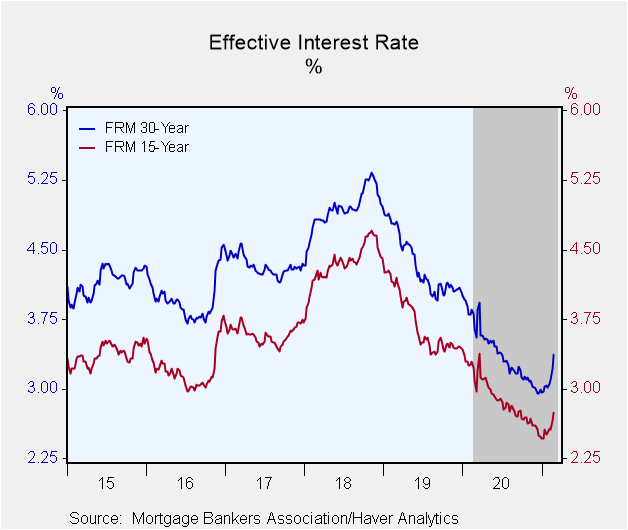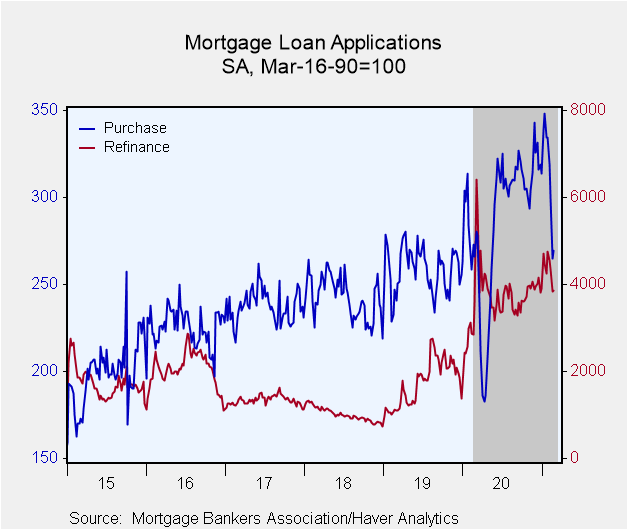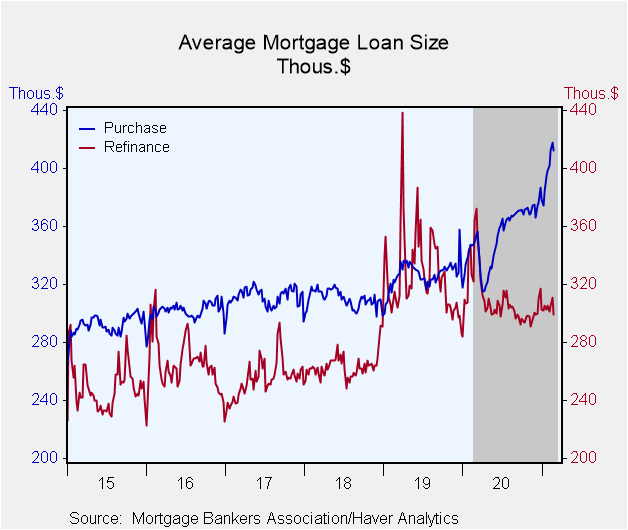 Global| Mar 03 2021
Global| Mar 03 2021U.S. Mortgage Applications Edge Up
by:Sandy Batten
|in:Economy in Brief
Summary
• Purchase loan applications rise; refinancing applications essentially unchanged. • Mortgage interest rates rise further along with other market rates. The Mortgage Bankers Association Mortgage Loan Applications Index edged up 0.5% [...]
• Purchase loan applications rise; refinancing applications essentially unchanged.
• Mortgage interest rates rise further along with other market rates.
The Mortgage Bankers Association Mortgage Loan Applications Index edged up 0.5% w/w (5.4% y/y) in the week ended February 26, its first increase in four weeks. Applications had declined in five of the previous six weeks. Applications for home purchase rose 1.8% w/w (1.5% y/y) after having declined in four of the previous five weeks. Applications for refinancing were essentially unchanged from the previous week (+7.1% y/y) following declines in each of the three previous weeks.
The refinance share of mortgage activity fell for the fourth consecutive week to 67.5% of total applications from 68.5%. The adjustable-rate mortgage (ARM) share of activity increased for the fourth consecutive week to 2.9% of total applications, the highest percentage since last July, from 2.7%.
Mortgage interest rates rose further last week as financial markets appear to be expecting stronger economic growth and some higher inflation ahead. The effective interest rate on a 30-year mortgage jumped up 15 basis points to 3.37%, its highest level since last June, on top of a 12 basis points increase the previous week. It is up 42 basis points from its low last December. The effective 15-year rate rose eight basis points to 2.74%. The effective rate for a 30-year Jumbo mortgage increased 10 basis points to 3.45%. The rate on a five-year ARM rose nine basis points to 3.05%.
The average mortgage loan size fell 2.5% to $336,200 in the week ended February 26. The average size of a purchase loan slipped 1.4% w/w to $412,300 from a record $418,000 in the previous week. The average size of a refinanced loan fell 3.7% w/w to $299,600.
Applications for fixed-rate loans edged up 0.3% w/w (+9.3% y/y) last week. Applications for adjustable-rate mortgages jumped up 7.6% w/w (-52.4% y/y) last week.
This survey covers over 75% of all U.S. retail residential mortgage applications and has been conducted weekly since 1990. Respondents include mortgage bankers, commercial banks and thrifts. The base period and value for all indexes is March 16, 1990=100. The figures for weekly mortgage applications and interest rates are available in Haver's SURVEYW database.
| MBA Mortgage Applications (%, SA) | 02/26/21 | 02/19/21 | 02/12/21 | Y/Y | 2020 | 2019 | 2018 |
|---|---|---|---|---|---|---|---|
| Total Market Index | 0.5 | -11.4 | -5.1 | 5.4 | 63.0 | 32.4 | -10.4 |
| Purchase | 1.8 | -11.6 | -6.1 | 1.5 | 11.4 | 6.6 | 2.1 |
| Refinancing | 0.1 | -11.3 | -4.7 | 7.1 | 111.0 | 71.1 | -24.3 |
| 30-Year Effective Mortgage Interest Rate (%) | 3.37 | 3.22 | 3.10 | 3.78
(Feb '20) |
3.40 | 4.34 | 4.94 |
Sandy Batten
AuthorMore in Author Profile »Sandy Batten has more than 30 years of experience analyzing industrial economies and financial markets and a wide range of experience across the financial services sector, government, and academia. Before joining Haver Analytics, Sandy was a Vice President and Senior Economist at Citibank; Senior Credit Market Analyst at CDC Investment Management, Managing Director at Bear Stearns, and Executive Director at JPMorgan. In 2008, Sandy was named the most accurate US forecaster by the National Association for Business Economics. He is a member of the New York Forecasters Club, NABE, and the American Economic Association. Prior to his time in the financial services sector, Sandy was a Research Officer at the Federal Reserve Bank of St. Louis, Senior Staff Economist on the President’s Council of Economic Advisors, Deputy Assistant Secretary for Economic Policy at the US Treasury, and Economist at the International Monetary Fund. Sandy has taught economics at St. Louis University, Denison University, and Muskingun College. He has published numerous peer-reviewed articles in a wide range of academic publications. He has a B.A. in economics from the University of Richmond and a M.A. and Ph.D. in economics from The Ohio State University.
More Economy in Brief
 Global| Feb 05 2026
Global| Feb 05 2026Charts of the Week: Balanced Policy, Resilient Data and AI Narratives
by:Andrew Cates










